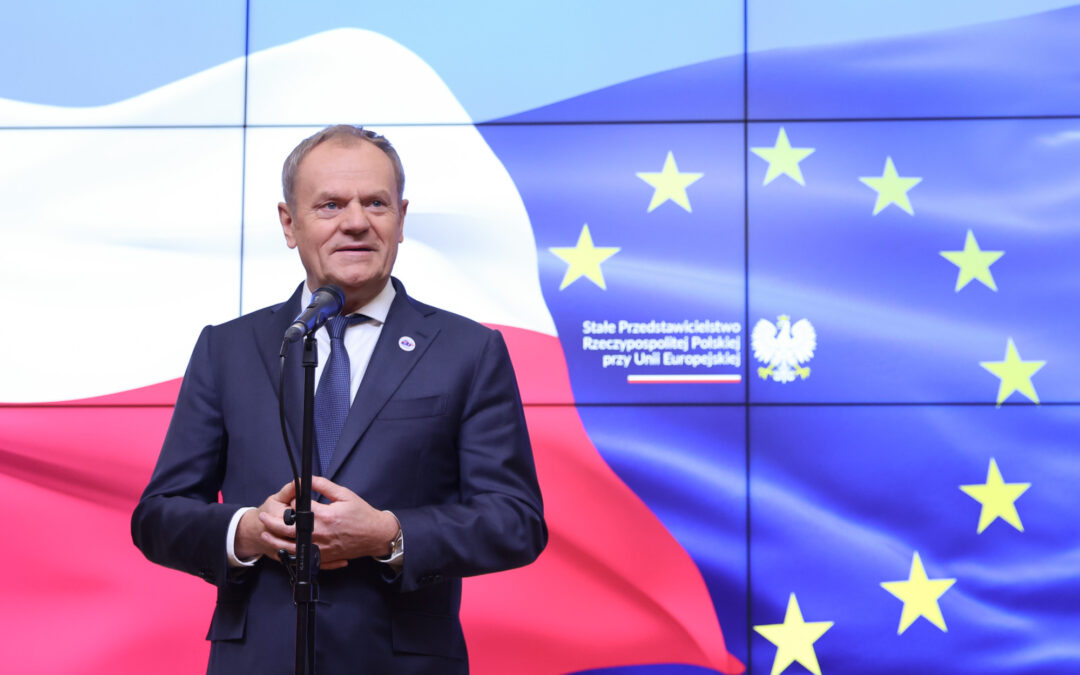Keep our news free from ads and paywalls by making a donation to support our work!

Notes from Poland is run by a small editorial team and is published by an independent, non-profit foundation that is funded through donations from our readers. We cannot do what we do without your support.
Poland has begun its six-month presidency of the Council of the European Union, a position that will allow it to shape the bloc’s agenda for the first half of this year. Warsaw wants strengthening Europe’s security to be the central theme of its leadership.
The presidency of the council rotates every six months between member states. Since joining the EU in 2004, Poland has only held the position once before, in the second half of 2011. Then, as now, Poland is led by Prime Minister Donald Tusk.
Witaj, Polsko! Hello @POLAND25EU.
I welcome the Polish presidency's focus on our Union's security, in all its dimensions.
We are going to launch many important initiatives in the first half of 2025.
So I'm grateful to have Poland’s determination and European spirit by our… pic.twitter.com/OYc2mot9sf
— Ursula von der Leyen (@vonderleyen) January 1, 2025
Poland takes over the presidency from Hungary, which has become something of a pariah in Brussels under the leadership of Viktor Orbán. Tusk, by contrast, is likely to be well received, having previously served as president of the European Council (a different body from the Council of the EU).
“Hello, Poland,” wrote European Commission President Ursula von der Leyen in Polish. “I welcome the Polish presidency’s focus on our Union’s security, in all its dimensions…I’m grateful to have Poland’s determination and European spirit by our side.”
German Chancellor Olaf Scholz, meanwhile, tweeted to Tusk (also in Polish) that “In these challenging times, we work together for a strong Europe…by standing shoulder to shoulder as good friends”.
The slogan Poland has chosen for its presidency is “Security, Europe!”. It notes that it is taking up the position at a “challenging time marked by conflicts, and our task will be to convince all 27 EU member states that Europe can continue to be the safest, most stable place on Earth”.
Its key aims are providing Ukraine with the support necessary in its defence against Russian aggression; strengthening the EU’s borders and combatting the “instrumentalisation of migration”; and bolstering defence capabilities, economic competitiveness, energy independence and food security.
Those points overlap with the domestic agenda of Tusk’s government, which has taken a hard line against Russia, accusing Moscow of mounting a “hybrid war” against Poland and the EU through acts of sabotage, cyberattacks, and the “weaponisation” of migration.
The EU is allocating funds to countries neighbouring Russia and Belarus to strengthen borders against the "weaponisation of migrants".
It also says states can introduce measures that “may entail serious interference with fundamental rights such as asylum” https://t.co/mqho2vBZeb
— Notes from Poland 🇵🇱 (@notesfrompoland) December 12, 2024
Tusk, who took power just over a year ago, has also continued the former Law and Justice (PiS) government’s strong support for Ukraine. He has also taken tough measures to bolster the security of its border with Belarus amid a migration and security crisis there.
“Poland must win this year,” said Tusk during a meeting of his cabinet on New Year’s Eve. “We will bear the responsibility for Europe on our shoulders.”
“Poland will be a place that the whole world will speak of with appreciation, not only because we defended democracy, but also because we are building a great civilisational success,” he added. “We will be a good example for the whole of Europe.”
NATO's secretary general has hailed Poland for "leading the way on defence spending" during a visit to Warsaw
Poland spends 4.12% of GDP on defence, the highest figure in NATO. "This sends a clear message to our adversaries and to the US," said Mark Rutte https://t.co/ks63JVPkmD
— Notes from Poland 🇵🇱 (@notesfrompoland) November 14, 2024
Among the European leaders to welcome Poland’s presidency was Ukrainian President Volodymyr Zelensky, who said that he hoped this year would see “tangible progress in negotiations regarding Ukraine’s accession to the EU”. He also warned that “only through strength can Russia be forced into peace”.
During a New Year’s address, Poland’s President Andrzej Duda, a PiS ally who has regularly clashed with Tusk’s government, called for Warsaw to use its presidency to “strengthen cooperation between the EU and the United States”.
“We in Poland know perfectly well that there is no safe Europe without the involvement of the United States,” said Duda, who has built a strong relationship with returning US President Donald Trump. However, Duda’s own final term in office finishes in the middle of this year.
Trump’s return to the White House will cause headaches for Poland's government, writes @danieltilles1
Yet while the conservative opposition has celebrated the US election result, it is also taking a big risk by aligning so closely with the president-elect https://t.co/mx59v8xuyX
— Notes from Poland 🇵🇱 (@notesfrompoland) November 8, 2024

Notes from Poland is run by a small editorial team and published by an independent, non-profit foundation that is funded through donations from our readers. We cannot do what we do without your support.
Main image credit: Kancelaria Premiera/Flickr (under CC BY-NC-ND 2.0)

Daniel Tilles is editor-in-chief of Notes from Poland. He has written on Polish affairs for a wide range of publications, including Foreign Policy, POLITICO Europe, EUobserver and Dziennik Gazeta Prawna.



















